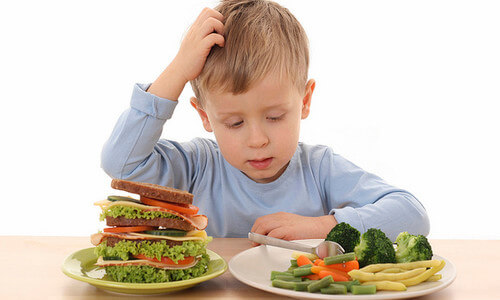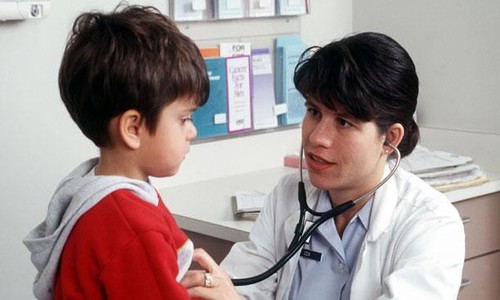Weight Loss During Childhood: Symptoms, Causes and Treatment

In general, weight loss during childhood can result from a variety of health problems. That’s why it’s important to identify the cause in time and combat it promptly.
Parents tend to worry when their children lose even a bit of weight, and start to think they may be malnourished. To clearly asses a child’s weight loss, parents must first be able to differentiate between normal and pathological.
Worrying about weight loss during childhood: is it a real danger or a parent’s exaggeration?
Weight loss during childhood can indicate certain health problems that affect the digestive system. Some conditions don’t affect a child’s diet, but do cause poor absorption of nutrients and consequently, weight loss.
One way to confirm your suspicions about your child’s weight loss is to compare his current weight to his weight when he performed his last medical checkup. A sudden decrease in more than 10% of a child’s previous weight or body mass index (this depends on the child’s weight and height) can be indicative of problems.
In general, as children grow, they should also gain weight (with the exception of those suffering from childhood obesity). Therefore, if there is a significant decrease in a child’s weight, whether it may be sudden or progressive, it’s a symptom that requires the attention of a medical professional.

Common causes of weight loss during childhood
The causes of weight loss during childhood are as diverse and varied as they are in adults. Weight loss can either be pathological or normal.
Here are the most common causes of weight loss during childhood:
Pathological
- Cancer.
- Hyperthyroidism.
- Anemia. This is usually caused by poor absorption of nutrients.
- Diabetes. Mainly when it hasn’t been detected.
- Celiac disease or gluten intolerance. These conditions can cause the child to avoid the consumption of foods that cause them discomfort.
- Gastrointestinal affections. These include bacterial infections and parasites.
Psychological causes
- Anorexia and bulimia.
- Intense stress.
- Acute depression (this could be caused by the loss of a family member).
Others
- Food poisoning.
- Recent surgical procedures.
- Consumption or misuse of drugs.
To find out the cause and treatment of your child’s weight loss, you should consult your doctor. However, there are certain guidelines that you can follow to facilitate treatment.

Episodes of depression, anxiety or stress
Episodes of stress, anxiety or depression can result from the loss of a loved one. They can also be caused by past or ongoing traumatic events.
If the source of the depression or stress is unknown by parents, it could be caused by an incident that happened (or is happening) outside of the home. Therefore, it’s important for parents to be able to ask the right questions to determine the cause of their child’s stress or depression.
If the trigger is known and unavoidable, it’s important to see a therapist. The specialist will help prevent the depression from becoming chronic. The right attention can also prevent episodes of stress from leaving behind disorders such as generalized anxiety.
Eating disorders
In these cases, parents must act a bit more subtly to detect them. These disorders are also being observed in children before they reach adolescence. Over 90% of eating disorders are seen predominately in women.
Unlike post-traumatic disorder where it’s possible to ask questions that allow for the identification of psycho-therapeutic solutions, when it comes to eating disorders, patients usually maintain a high degree of denialism.
In general, it’s important to consult a specialist to evaluate your child if he or she is losing weight. Depending on the circumstance, the specialist will create a plan to approach the problem.
All cited sources were thoroughly reviewed by our team to ensure their quality, reliability, currency, and validity. The bibliography of this article was considered reliable and of academic or scientific accuracy.
- Jin Y., Cho J., Lee I., Park S., et al., Involuntary weight loss and late life depression in korean older adutls. Iran J Public Health, 2020. 49 (4): 637-644.
- Weersing VR., Jeffreys M., Do MC., Schwartz KT., et al., Evidence base update of psychosocial treatments for child and adolescent depression. J Clin Child Adolesc Psychol, 2017. 46 (1): 11-43.
This text is provided for informational purposes only and does not replace consultation with a professional. If in doubt, consult your specialist.








